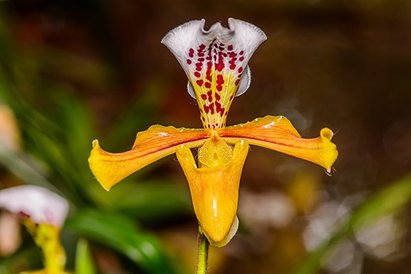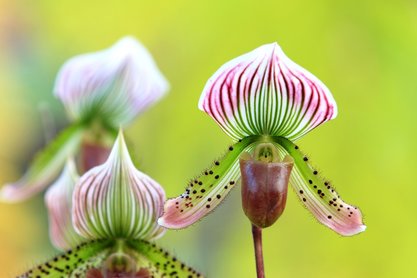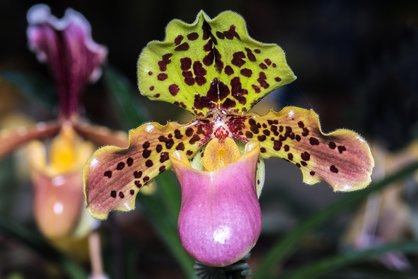Paphiopedilums at a Glance
Temperature: Warm temperatures in general
Water: Should be almost dry between watering
Light: Shaded mostly (70 – 80%); they do very well indoors
Humidity: 40 – 75%
Food: Better-Gro Orchid Plus twice a month weekly – half the strength that you would use on other orchids
Water: Should be almost dry between watering
Light: Shaded mostly (70 – 80%); they do very well indoors
Humidity: 40 – 75%
Food: Better-Gro Orchid Plus twice a month weekly – half the strength that you would use on other orchids
The Paphiopedilum are usually known as the “Lady Slipper” orchid, but some people just call them “Paphs.”
|
Flower
Paphs are often overlooked because they do not look like flowers that you would see in a cut flower arrangement. Paphs are a great conversation piece and get the name “Lady Slipper” because of their unique, pouch-like bloom that resembles a lady’s slipper. Climate Paphs prefer high humidity – 40% or higher – which may be difficult to provide in heated homes during the winter. Placing a water-filled tray of pebbles under the pot and an occasional misting can help satisfy the orchids’ needs. The “Bulldog” types require temperatures from 50 degrees to 65 degrees. |

Light Requirements
These orchids are one of the easiest orchids to grow in the home because they do not require as much light as some of the other varieties. Keeping plants a foot or so back from an east or west window should provide ample light. If you air condition your home during the summer, your Paphs may be happier spending their time outdoors under a shady tree. Make sure that there is no danger of frost before moving any orchids outdoors.
Watering Requirements
The potting medium should be kept damp but never soggy. Keeping Paphs too wet will only result in root loss. It is important to remember to water Phaps early in the day and avoid letting water remain on the top of the leaves or in the crown overnight. Water left standing in the crown overnight can lead to crown rot and the loss of the orchid. Do not place water or food in the “pouch” of the orchid.
These orchids are one of the easiest orchids to grow in the home because they do not require as much light as some of the other varieties. Keeping plants a foot or so back from an east or west window should provide ample light. If you air condition your home during the summer, your Paphs may be happier spending their time outdoors under a shady tree. Make sure that there is no danger of frost before moving any orchids outdoors.
Watering Requirements
The potting medium should be kept damp but never soggy. Keeping Paphs too wet will only result in root loss. It is important to remember to water Phaps early in the day and avoid letting water remain on the top of the leaves or in the crown overnight. Water left standing in the crown overnight can lead to crown rot and the loss of the orchid. Do not place water or food in the “pouch” of the orchid.


